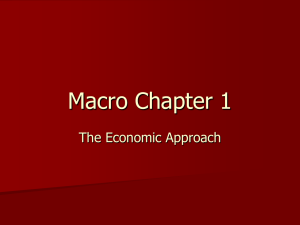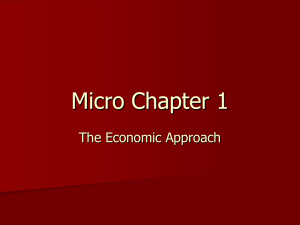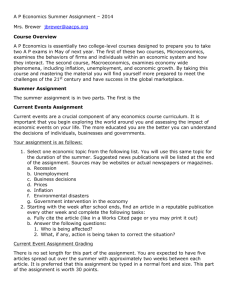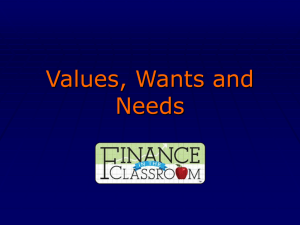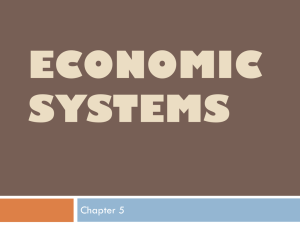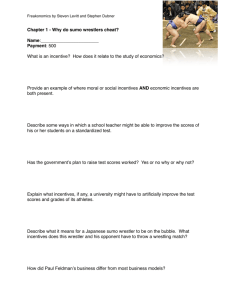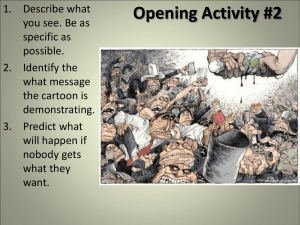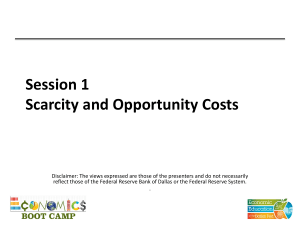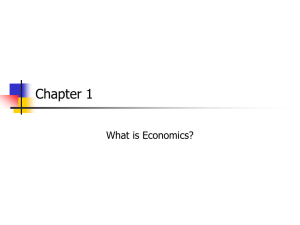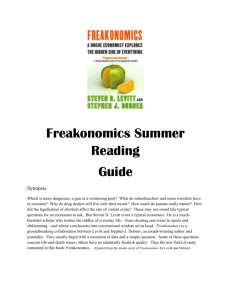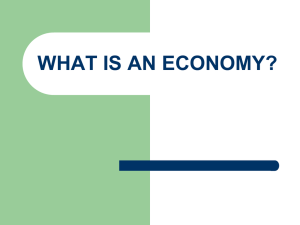What Is Economics About?
advertisement
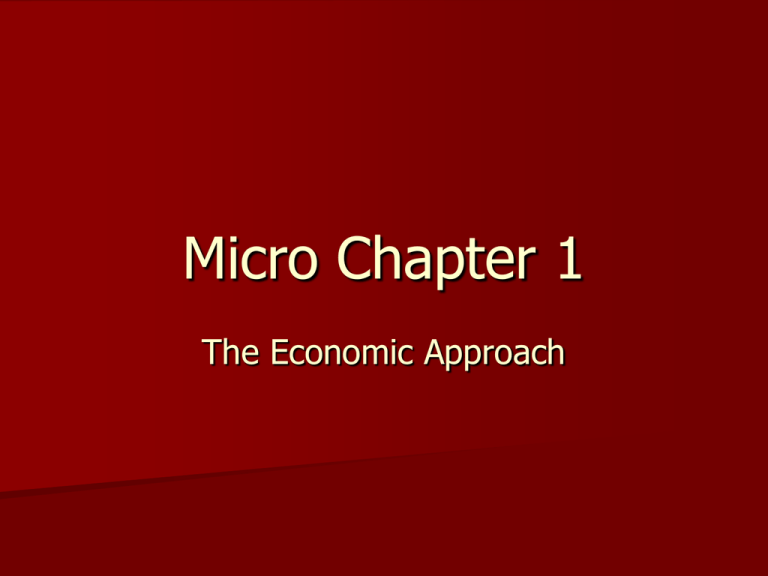
Micro Chapter 1 The Economic Approach 4 Learning Goals 1) Identify and list the critical components of economics. 2) List and provide examples of the eight guideposts of economic thinking. 3) Distinguish between two types of economic statements 4) Avoid making four common mistakes Compare and Contrast: A. All the possessions you have right now B. All the possessions you had 10 years ago Which group would you rather have? Why? Improving standards of living doesn’t just happen by accident Actually, they don’t have to improve at all Watch Video: Hans Rosling- 200 countries 200 years Would you give up the internet for the rest of your life for $1 million right now? Watch Video: Would you give up the internet What Is Economics About? Economics tries to explain and predict the behavior of consumers, firms, and government. John M. Keynes: “Economics does not furnish a body of settled conclusions immediately applicable to policy. It is a method rather than a doctrine, an apparatus of the mind, a technique of thinking which helps its possessor to draw correct conclusions.” Steven Levitt & Stephen Dubner Super Freakonomics The economic approach isn’t meant to describe the world as any one of us might want it to be, or fear that it is, or pray that it becomes- but rather to explain what it actually is. Most of us want to fix or change the world in some fashion. But to change the world, you first have to understand it. Steven Levitt & Stephen Dubner Super Freakonomics Instead of thinking of such stories as “economics,” it is better to see them as illustrating “the economic approach.” That’s a phrase made popular by Gary Becker, the longtime University of Chicago economist who was awarded a Nobel Prize in 1992. In his acceptance lecture, he explained that the economic approach “does not assume that individuals are motivated solely by selfishness or gain. It is a method of analysis, not an assumption about particular motivations.. .Behavior is driven by a much richer set of values and preferences.” Optional Video: RSAnimate-Freakonomics Scarcity and Tradeoffs Scarcity leads to tradeoffs which result in making choices Scarcity and Tradeoffs Thomas Sowell: “In the world that people live in, and are likely to live in for centuries to come, trade-offs are inescapable. Even if we refuse to make a choice, circumstances will make choices for us, as we run out of resources for many important things that we could have had, if only we had taken the trouble to weigh alternatives. ” Historically, mechanisms that have been used to deal with the problem of scarcity: 1. Force 2. Tradition (emphasized past ways, relied on families) 3. Authority (government and church) 4. Market 5. Combinations of 1-4 Scarcity and Tradeoffs Scarcity requires that some wants remain unfulfilled Issues of equity, justice, and fairness are embedded with scarcity Class Perspective We will focus on the market process of dealing with scarcity. At times we will compare and contrast with the government or collectivist process. Do not confuse the market process as being the same as politically conservative. Do you think the world will ever run out of oil? Watch Video: Stossel- Oil supplies The Economic Way of Thinking Milton Friedman: “The only person who can truly persuade you is yourself. You must turn the issues over in your mind at leisure, consider the many arguments, let them simmer, and after a long time turn your preferences into convictions.” Always have these guidelines in your economic thought process: The text lists 8 guidelines. (1) There are always tradeoffs. What you give up is your opportunity costvalue of next best alternative Common mistake: opportunity cost is NOT the sum of everything you give up There is no such thing as a free lunch! (1) There are always tradeoffs. Optional Video: Milton Friedman- free lunch myth (2) Individuals choose purposefully Referred to as economizing behavior-try to get the most benefits for the least cost or effort Also known as rational behavior Alfred Marshall: “It is deliberateness, and not selfishness, that is the characteristic of the modern age. Steven Levitt & Stephen Dubner Super Freakonomics Human behavior is influenced by a dazzlingly complex set of incentives, social norms, framing references, and the lessons gleaned from past experience- in a word, context. We act as we do because, given the choices and incentives at play in a particular circumstance, it seems most productive to act that way. This is also known as rational behavior, which is what economics is all about. (3) Incentives matter As the incentive goes up, you will be more likely to do something (or try to), and vice versa The incentive doesn’t have to be money Watch Video: Freakonomics- potty training incentives Steven Levitt & Stephen Dubner Super Freakonomics If John List’s research proves anything, it’s that a question like “Are people innately altruistic?” is the wrong kind of question to ask. People aren’t “good” or “bad.” People are people, and they respond to incentives. They can nearly always be manipulated-for good or ill- if only you find the right levers. So are human beings capable of generous, selfless, even heroic behavior? Absolutely. Are they also capable of heartless acts of apathy? Absolutely. (3) Incentives Matter Optional Video: RSAnimate-surprising truth about what motivates (4) Think on the margin, not in total or on average Marginal means additional or incremental Marginal _______ is additional _______. Rule to live by: Continue to engage in an activity as long as the expected marginal benefit is greater than the expected marginal cost. (5) More information leads to better decision-making, but more information is costly to get Refer back to (1) through (4) 1) 2) 3) 4) There are always tradeoffs Individuals choose purposefully Incentives matter Think on the margin (6) Many choices create a secondary effect. The primary effect is often immediate and visible The secondary effect usually comes later and is not as visible Watch Video: Stossel Micro 01opportunity costs and tradeoffs (7) Value is subjective Beauty is in the eyes of the beholder Value is determined by the purchaser (8) Economic thinking is scientific thinking Economists use data and information generated by people to explain and predict actions Class Activity: Do you believe that red cars receive more traffic tickets? Why or why not? Watch Video: 20/20 Myths- red cars get more tickets Steven Levitt & Stephen Dubner Super Freakonomics But while there are exceptions to every rule, it’s also good to know the rule. In a complex world where people can be atypical in an infinite number of ways, there is great value in discovering the baseline. And knowing what happens on average is a good place to start. By so doing, we insulate ourselves from the tendency to build our thinking- our daily decisions, our laws, our governance- on exceptions and anomalies rather than on reality. Positive and Normative Economics Reading: Milton Friedman-Essays in Positive Economics The introduction and Section 1 (pages 1 through 3) are relevant; you may skip the rest. Pitfalls To Avoid in Economic Thinking Don’t make one of these errors: (1) Violation of ceteris paribus. – Ceteris paribus is Latin for “other things constant.” – We want to isolate variables so we typically allow only one to change at a time. Errors: (2) Good intentions do not necessarily result in good outcomes Milton Friedman: “There is nothing that does so much harm as good intentions” Errors: (3) Association is NOT causation Watch Video: Freakonomics- polio cause and effect Errors: (4) Fallacy of Composition – Assumption: what’s good for the individual is good for the group. – Making this assumption is the fallacy. – Watch Video: Seinfeld-Fire clip
